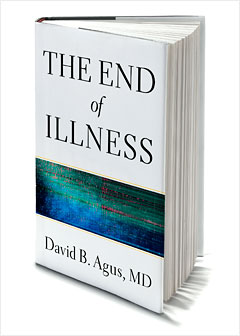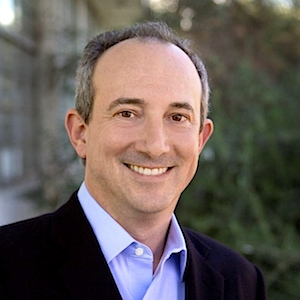(单词翻译:单击)

At a meeting of the nation's top oncologists in Denver a couple of years back, Dr. David Agus, a prominent cancer researcher, was giving a keynote address. Agus talked about the need to take a new approach to treating cancer. He argued that focusing on killing or slowing the spread of cancerous cells was not enough. After all, despite a half-century of research by some of the best medical minds in the world, the death rate from cancer hasn't changed much since the 1950s. Instead, doctors should try to keep a patient's entire system healthy so the disease is less likely to take root in the first place. He said we should be able to control cancer without fully understanding it. At that, hisses arose from the audience.
几年前,在丹佛举办的一次全美顶尖肿瘤学家的会议上,知名癌症专家大卫·阿古斯博士做了一次专题演讲,指出有必要采取一种新的方法来治疗癌症。他认为,只关注如何杀死癌细胞或减缓癌细胞的扩散是不够的。半个世纪以来,尽管世界各地的医学精英为攻克这一难题进行了不懈的研究工作,但今天的癌症死亡率并没有比上世纪50年代降低多少。因此,医疗人员应该想办法保持病人整个机体的健康,从根本上降低肿瘤在人体内扎根的可能性。他表示,虽然我们目前还不完全了解癌症的病理机制,不过我们依然应该有办法控制癌症。说到这里,听众中响起了一阵嘘声。
A few Bronx cheers aren't enough to discourage a scientist as determined as Agus. He believes he has found a new way to greatly reduce the odds of getting sick and has set out his philosophy in a potentially game-changing new book, The End of Illness, which just became a New York Times bestseller. In it, he offers his prescription for preventive medicine, and backs it with studies and lively anecdotes.
不过这点嘘声并不能使像阿古斯这样坚定的科学家感到气馁。他相信他已经找到了一种办法,可以大大降低人体生病的几率。阿古斯把他的理论写成了一本有可能具有颠覆意义的新书——《疾病的终结》(The end of illness),这本书刚刚登上了《纽约时报》(New York Times)的畅销排行榜。阿古斯在书中阐述了他的防病理论,并用相关研究和生动的病例进行了佐证。
When I caught up with this slim, casually dressed man, he rattled off ideas as if he couldn't let the world know fast enough about his thinking: "I want doctors to treat toward health and not treat toward disease," he said. Agus had his eureka moment after reading a 2004 Fortune article called "Why We're Losing the War on Cancer," by Cliff Leaf. Himself a cancer survivor, Leaf, a Fortune editor at the time, wrote that researchers have come to treat the individual features of cancer rather than putting their efforts into directly controlling cancer. "We have forgotten that curing cancer," says Agus, who was on the team of doctors who treated Steve Jobs in the last years of his life, "starts with preventing cancer in the first place."
我采访这位身材瘦削、衣着随意的医学家时,他飞快地介绍着他的想法,仿佛唯恐全世界不能尽快了解自己的思想。他说:我希望医生们从病人健康时就着手治疗,而不是到生病时才去治。阿古斯的灵感来自他2004年在《财富》杂志(Fortune)上读到的一篇文章:《为什么我们输掉了与癌症的战争》(Why We're Losing the War on Cancer)。文章作者克里夫·利夫当时担任过《财富》杂志编辑,他本人就是一名癌症幸存者。他写道,癌症研究人员们习惯于治疗癌症的各种症状,而不是设法直接控制癌症。史蒂夫·乔布斯去世前的最后几年,阿古斯也是乔布斯治疗团队的一员。阿古斯说:我们忘了治癌要从防癌开始。
Today, if we get cancer, we attack the cells. If we get a heart attack, we perform a bypass. That's fine, but why not avoid the disease in the first place? Agus believes that diseases like cancer and heart disease should be thought of as verbs and not nouns. In his lexicon, "cancering" suggests a systemic problem. He points to a study of women who, after treatment for breast cancer, were given either an osteoporosis drug or a placebo. The ones who took the drug had a 40% lower rate of recurrence of the cancer, as their system was changed and the cancer didn't grow back. "Keep the soil healthy," says Agus, "and the bad seed won't grow."
今天,一旦病人得了癌症,我们就会试图去杀死癌细胞。如果病人心脏病发作,我们就做心脏搭桥。这无可厚非。但我们为什么不能防病于未然 呢?阿古斯认为,我们应该把癌症和心脏病这类疾病看成一个动词,而不是名词。在阿古斯的字典里,患有癌症意味着一个系统性的问题。他指出,在一项研究中,一组女性在接受了乳腺癌治疗后,医生向她们发放了一些治疗骨质疏松的药物或安慰剂。但服用了这些药物的患者的复发率却比平均水平低了40%。随着她们的身体系统发生良性改变,癌症没有再复发。阿古斯说道:只要保持土壤健康,坏的种子就无法萌芽。
One way to keep your body's soil healthy is to treat inflammation. When something is wrong with your body, it goes into panic mode and triggers inflammation, a process that rallies the vascular, immune, and cellular systems to heal injured tissue. Numerous studies show that patients who take statins — which not only lower cholesterol but reduce inflammation — lowered cancer rates by 40%, although no one knows exactly why. That's not all. A growing body of evidence suggests that inflammation may be linked to a host of other diseases, from heart attacks to Alzheimer's to diabetes. This doctor's orders? Ask your physician if you should be on Lipitor or other statins and a regimen of baby aspirin, which help curb your body's inflammation.
保持身体土壤健康的方法之一是治疗炎症。身体出毛病的时候,人体机能就会进入一种恐慌模式,引起炎症。发炎这个过程就是身体在调动血管、细胞和免疫系统来修复受损的组织。大量研究表明,服用他汀类药物的病人,患癌几率会降低40%,只是具体原因尚不明确。他汀类药物不仅能降低胆固醇,还可以消炎。此外还有越来越多的证据显示,炎症可能与大量其它疾病有着联系,如心脏病、老年痴呆、糖尿病等。阿古斯对此有何建议呢?可以询问医生,看看是否可以服用立普妥(Lipitor)或其它的他汀类药物,或经常服用小剂量阿斯匹林来养生,这有助于人们控制身体的炎症。

There are other simple ways to fight inflammation. Agus explains that it's better to walk a lot than to do an intense burst of exercise and then sit behind a desk all day. (The rhythmic part of walking helps your lymphatics function, part of the system that controls your immune system.) Wear comfortable shoes, which lowers stress on joints. (Walking barefoot or in high heels can cause damage to the joints and thus inflame your feet.)
此外还有一些预防炎症的简单方法。阿古斯解释道,与其一次性进行大量高强度的激烈运动然后在桌子后面坐一整天,远远不如多走点路更好。(走路的节奏对人体的淋巴系统有益,而淋巴系统在一定程度上控制着免疫系统。)尽量穿舒服的鞋子,它可以减轻关节的压力。(光脚或穿高跟鞋走路可能导致关节受损,从而引发足部炎症。)
His approach has its detractors. Dr. Rita Redberg, a professor of medicine at UCSF, argues that the evidence doesn't support the widespread use of statins. "I prescribe medicine to make people feel better or live longer, and statins do neither," she says. Not only that, statins can have side effects ranging from muscle aches to diabetes.
不过也有人反对阿古斯的理论。比如加州大学旧金山分校(UCSF)的医学教授丽塔·莱德伯格认为,现有证据并不支持他汀类药物的广泛使用。她说:我给病人开药的目的是要让病人感觉更好或活得更久,而他汀类药物并不能起到以上任何一种效果。不仅如此,他汀类药物还可能导致包括肌肉疼痛和糖尿病在内的副作用。
Of course, Agus thinks statins in many cases do more good than harm and, anyway, are just one tool in his arsenal. The nice thing about his approach is that nothing requires a superhuman effort — a lot of it is just commonsense, healthy living.
当然,阿古斯还是认为他汀类药物在许多情况下利大于弊。除此之外,他还有许多别的养生办法,这些办法好在并不需要我们做出什么超人的努力。阿古斯的许多养生之道都是常识性的,也就是培养健康的生活方式。
Agus also believes we need new tools to really understand our bodies. He suggests that each of us get genetically profiled. This won't tell us whether we'll contract a certain disease but will tell us the probability of getting it, allowing us to make the proper adjustments. A few years ago he co-founded Navigenics, a company that does genetic screening at $400 a pop and is backed by venture capitalist John Doerr of Kleiner Perkins, an early investor in Google (GOOG). When Agus had his own DNA profiled — the results are in the book for all to see — he found he was at risk of having a heart attack. This was strange because his cholesterol had always been low. Nonetheless, it was enough to persuade him to go on a healthier diet and start taking statins.
阿古斯也相信,我们还需要一些新的工具才能真正了解我们的身体。他建议我们每个人都应进行基因成像。基因图像并不会告诉我们是否会染上某种疾病,但会告诉我们染上这种病的几率有多大,从而帮助我们做出正确的判断。几年前,他与别人合作创办了一家名叫Navigenics(意为基因导航——译注)的公司,专门提供基因检测服务,每次收费400美元。这家公司得到了凯鹏华盈投资公司(Kleiner Perkins)风投家约翰·杜尔的资助,他是谷歌的早期投资人之一。阿古斯也给自己的DNA画了像,还把结果展示在书里公之于众——他发现自己存在罹患心脏病的风险。这有点奇怪,因为他的胆固醇水平一直很低。尽管如此,他还是开始摄入更健康的饮食,并开始服用他汀类药物。
New tools may also make it possible to detect diseases at a much earlier stage. The key is understanding how proteins — which are the building blocks of life — operate. Faulty proteins can be early indicators of a disease. The trouble is, tracing proteins is incredibly hard to do — they are the size of a single neutron. About eight years ago Agus started another company called Applied Proteomics. He joined up with supercomputer guru Danny Hillis to create a system with the horsepower to catalogue hundreds of thousands of protein levels. The company is still a work in progress, but if it succeeds, it will provide an important diagnostic tool.
我们在一些新工具的帮助下或许能在更早的阶段检测到隐藏的疾病。问题的关键在于我们需要理解构建生命的基石——蛋白质的活动机理。缺损的蛋白质可能是某种疾病的早期标志,然而追踪蛋白质是一项极其因难的工作——蛋白质的大小只有一个中子那么大。大约8年前,阿古斯创办了另一家公司,名叫 Applied Proteomics。他与超级计算机专家丹尼·希利斯合作开发了一个系统,有能力对几十万个蛋白质水平进行编目。目前这家公司仍处于科研阶段,一旦它取得成功,就能为医学界提供一个重要的诊断工具。
When Agus's book was reviewed by the Daily Mirror in England last month, he says he got 7,000 angry blog and e-mail responses. Some accused him of trying to cash in on his DNA-profiling firm. Agus's response? That he has only a small stake in the DNA firm.
阿古斯说,上个月英国的《每日镜报》(Daily Mirror)刊发了一篇书评,介绍了他的新书,结果一下子有7,000多人愤怒地发博文或写电子邮件对他进行谴责。有些人指责他想乘机宣传自己的基因成像公司以此谋利。阿古斯对这个问题的回答是,他在那家DNA公司只有很少的股份。
Agus, however, has a bigger challenge ahead. He needs to get his ideas widely accepted by the medical community. Maybe then he can turn those hisses into cheers.
实际上,阿古斯未来面临着更大的挑战——他需要让自己的理念被医学界广泛接受。也许到那时,他才能把听众席上的嘘声变成欢呼声。


